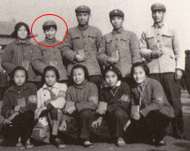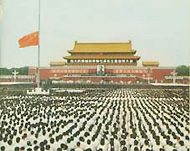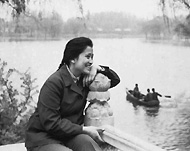‘Mao knew these people would die’
Jung Chang and her husband, Jon Halliday, are the authors of “Mao: The Unknown Story”, an epic 800-page biography of Mao Zedong. It provoked a mixed reaction when published last year for its depiction of Mao as a power-mad tyrant.

Jung Chang made her name with Wild Swans, a poignant tale of how three generations of women survived the turmoil of 20th-century China.
In researching Mao, the husband and wife team spent 10 years trawling archives across the former Soviet Union, China, and the United States. The book has sold more than half a million copies in hardback and will soon be released in Chinese.
Aljazeera.net: What was it like to live under Mao and how did you regard him?
Jung Chang: I was born into Mao’s China and grew up with him as a godlike figure. In the same way that one must eat to live, one must worship Mao.
But I did question him – not his name, but his rule, when I was 14 when the Cultural Revolution started. There was a lot of violence and atrocities and I was terrified. And then my parents became victims of the fighting and I think that was the main thing. I loved my parents and when I had to choose between my parents and Mao, I chose my parents.
AJ: Mao died 30 years ago. How did you feel when you heard the news?
 |
|
Jung (circled) in her days as a red |
JC: I was in Chengdu at university where we gathered and were told he had died. I felt euphoric. And then I realised everyone seemed to be crying. As my tearless face could cause problems I buried my head on a girl’s shoulders and heaved appropriately.
But I don’t know how many of those tears were genuine and how many people had been acting all their lives under Mao.
AJ: Was it difficult to return to China to research Mao after what happened?
JC: The trips made me very emotional. You came across one tragic story after another. So many people had such awful lives. By comparison my life was extremely privileged even though my family suffered. So to listen to these people opened my eyes to just how awful Mao’s rule was.
|
“He had incorporated this number of deaths in his planning and he did not want to stop” |
There were a lot of things I had never dreamed of. For example, in the Great Famine in 1958-61 when nearly 40 million people died of starvation I had always thought it was about economic mismanagement. But during our research I realised that Mao knew these people would die.
He had incorporated this number of deaths in his planning and he did not want to stop.
AJ: In your book Mao comes across as a monster. Did he have no redeeming features?
JC: We do not use the word monster but he was certainly immoral.
[As for] redeeming features? He had tremendous foresight, strategic vision, he was able to conquer China, and perhaps without him the Chinese Communist Party would never have come to power.
He loved books but the problem was he would not allow hundreds of millions of Chinese to read, so is that a redeeming feature?
 |
|
Mao’s death brought millions of |
AJ: But why is he still so revered, both internationally and in China?
JC: I think the main reason is China is still a communist state, and Chinese leaders claim legitimacy from Mao. Because they are not democratically elected they have to justify their rule in some way so they said Mao is this great leader and hero and was the founding father of modern China and therefore we are legitimate.
They can also see that Mao equals the Communist Party, and, if they renounce Mao, in today’s world this one-party rule would probably have to fall.
And outside China, partly because the Chinese themselves are not speaking up about Mao’s rule in the same way Jews talk about Hitler or Russian exiles talked about Stalin, even those books that do come out don’t seem to affect the West in the same way as writing about a gulag.
 |
|
Jung and Halliday’s biography is |
Jon Halliday (JH): Mao, at the end of his life, was at a period when Western countries recognised him and blew him up as a great world leader, and someone you could do business with. He dies at a moment when he is being glorified in the West and the UN flew its flags at half-mast even though he was not head of state.
And then lots of Western statesmen who grovelled to him in power wrote eulogies. So he went out on a high, fostered in part by foreign countries.
JC: Another factor is the Sinologist viewpoint of Mao. Particularly among Sinologists in America, so-called China experts, there are people who are either apologists for Mao, or treat him far more reverentially than he deserves. These people have written books around those lies, and have taught students around those lies, and they don’t want their lie challenged, and in a way they are helping the Chinese government to perpetuate this myth.
AJ: But why have these Sinologists drawn different conclusions to you about Mao?
JC: Partly they did not do their research. And partly because the Chinese state is determined to cover up so it also makes it more difficult for them to do their research.
And sometimes, I think, people don’t treat Chinese lives with the same weight as other lives. People tend to think there are an awful lot of Chinese. That tens of millions of people perished under Mao is a fact. But that is not enough to make people condemn him.
AJ: When you first started researching the book what impressions did you hold on Mao and how did they influence your line of inquiry?
 |
|
Jung: Researching the book |
JC: My idea of Mao when I started was that he started out all right. That he basically did good things; was an idealist, was keen to fight Japan, he completed the heroic Long March, and beat the corrupt regime of Chiang Kai-Shek; that [the communist takeover in] 1949 was a good event.
And that after that there were a few years of honeymoon, so to speak, of relatively benign rule. But that from 1957 and the anti-rightist movement he started to go bad. The Great Leap Forward was terrible, the famine was terrible, and the Cultural Revolution was the worst.
However, what we found in these 10 years of research took me completely by surprise. It was shock after shock. Mao wasn’t an idealist. It was all totally different from my assumptions before the research.
AJ: This year was the 40th anniversary of the start Cultural Revolution, of which there was little coverage in China. Do you think it necessary for countries to come to terms with history?
|
“If China wants to have any political reforms at all the rejection of Mao and Maoist legacies is absolutely essential” |
JC: People don’t have to believe in history. They can lead completely materialistic lives. If China wants to have any political reforms at all the rejection of Mao and Maoist legacies is absolutely essential.
JH: Coming to terms with history is vital. Nations are like human beings. You can’t live without knowing your own past. It is even dangerous, particularly when in that past there are a lot of mistakes and crimes.
 |
|
Jung Chang shortly before |
For example, take China’s relationship with Japan. A great deal of that is based on competing versions of history. Some of that is very propagandistic but underlying that are horrific crimes committed against the Chinese by the Japanese. I wonder what would happen if someone were to get through to the Chinese that the Chinese Communist Party killed more Chinese than the Japanese did?
AJ: What do you think the consequence of doing that would be? Opening old wounds could perhaps lead to a further period of recriminations?
JH: I don’t think countries that have had a process of truth and reconciliation committees, like South Africa and Chile, have been weakened in any way. There are issues of how this would be handled and there needs to be an emphasis on the word reconciliation. But in the end it comes back to the relationship between freedom of information, democracy, and the rule of law.
The Chinese Communist Party claims a monopoly on power and criminalises the concept of pluralism and this cycle can’t be broken until there is freedom of information and there is democracy. It would be a safer country for the rest of the world and be better for the Chinese. Truth and reconciliation doesn’t have to produce social disorder.
JC: People have not forgotten Mao’s rule and its impact on people’s lives. The truth has been swept under the carpet.
Is it better to give vent to people’s feelings through truth and reconciliation or is it better to suppress and let the volcano erupt one day? And it could, because the country is fragile and could not weather a real crisis.